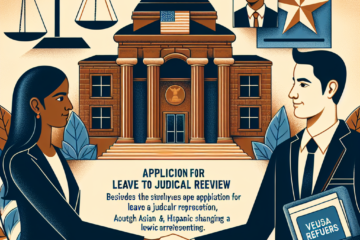Table of contents
As a Canadian Immigration Lawyer, one of the most frequent questions I encounter from prospective immigrants pertains to the confusing and often daunting process of visa refusals. Undeniably, the decision of a visa refusal can be disheartening, but it is crucial to understand that it is not the end of the road. There is a legal recourse available in the form of Judicial Review, which can potentially overturn the refusal decision. This article aims to shed light on the role and benefits of Judicial Review in the context of Canadian Visa Refusals.
Understanding the Role of Judicial Review in Canadian Visa Refusals: Insights from an Immigration Lawyer.
Judicial Review is a legal process by which an individual or entity can seek to have a government decision, including visa refusals, reviewed by a court. As an Immigration Lawyer, my role is to guide clients through this legal labyrinth. The Judicial Review process begins when an application is filed in Federal Court against the decision made by the immigration officer. The Court then examines the legality and reasonableness of the decision made by the immigration officer. It is important to note that Judicial Review is not a re-evaluation of the application, but a review of the way the decision was made. If the Court finds that the decision was made in an unfair or unlawful manner, it can quash the refusal and order a re-assessment of the application by a different officer.
Benefits of Judicial Review for Canadian Visa Refusals: An Immigration Lawyer‘s Perspective.
From my experience as an Immigration Lawyer, I can say that the Judicial Review process provides a fair and just platform for applicants to challenge visa refusals. While the process can be complex and time-consuming, the potential benefits are significant. Firstly, Judicial Review offers the opportunity to correct errors or oversights made by immigration officers. Secondly, it provides a chance for the applicant to present new evidence or information that was not considered in the original decision. Thirdly, it ensures a fair hearing and a transparent decision-making process. Lastly, a successful Judicial Review can pave the way for the approval of the visa application, as the case is usually sent back for re-assessment by a different immigration officer.
In conclusion, as an Immigration Lawyer, I can attest that visa refusals can be a significant setback. However, it is essential to remember that there are legal recourses available, such as Judicial Review, which can potentially overturn the refusal decision. While the process can be complex, the assistance of a knowledgeable and experienced Canadian Immigration Lawyer or Immigration Consultant can make the journey less daunting and increase the chances of success. It’s crucial to remember that a visa refusal is not the end of the road; it is merely a detour that, with the right legal guidance, can be navigated successfully.



0 Comments